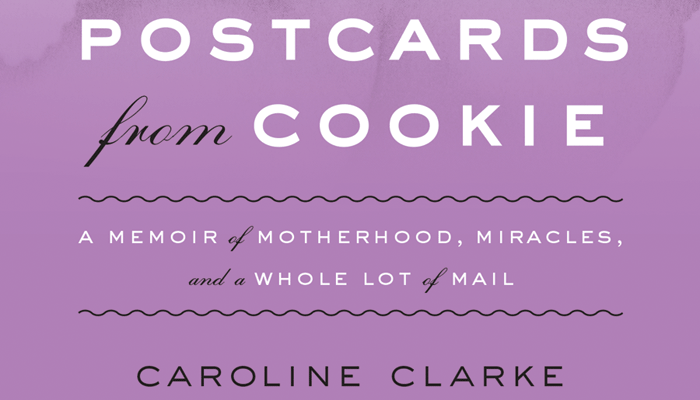Harper; Reprint edition; 2015
Buy Postcards from Cookie on Amazon.com >
“The Call”
I can think of lots of reasons not to make this call: I should be working. I’m on deadline. I’m not ready.
It’s March 18, 2002. I’ve been staring at the scrap of paper with her number on it for weeks, trying to figure out what to say, how to say it, and whether or not I really want to open this colossal can of worms at all. She gave me life, then gave me away. I thought that was all there was supposed to be, but here I am, preparing to phone my birth mother at her office.
Needing the comfort (and guidance and crutch) of words on a page, I scripted and rescripted myself the way a girl does in junior high school the first time she’s going to call a boy. In recent weeks, I had dialed her number twice. The first time I hung up before the phone even rang, the second time I hung up just as someone answered. I had delayed this third attempt, repeatedly.
Now, as I lift the receiver, I note the time. It’s 4:06 Eastern Standard Time; still lunchtime on the left coast. She’s probably not even there, a notion that strikes me as somewhat appealing.
Finally I dial, fine with the potential futility of it.
Calling at one o’clock on a weekday makes perfect sense. It’s like wading into the pool instead of diving. I never dive in. I always do the toe test first. I dip one foot in, then the other. I acclimate, then walk in up to my knees, then my hips, keeping my hands above the water. Gingerly, I splash my upper body and wait until the goose bumps recede before gliding in up to my neck. Once there, I finally let myself go until, voilà, I’m fully under. It’s a process. I’m deliberate, practical. I’m also, generally, scared.
I punch in each digit, feeling pleased and message-ready. My foot’s in the pool and the water feels fine.
One ring. I tuck the receiver into my neck, pick up my cream soda, and take a long sip. Another ring and then a female voice.
“KCP. Hello?” Young, breathy, a college intern maybe.
“Hi, may I speak with Carole, please?” I sound downright breezy.
I lean back in my chair, purse my lips over my straw, and hear the same voice say, “Speaking.”
I sit up, swallow, and freeze. All sound, all movement, my breath, my heart, the revolving planet, and time itself seem to stall for a moment, waiting for me to process her one simple word, and I am having major trouble doing it.
I’m underwater, gripped by panic.
Think, I tell myself. Breathe. Oh God. Speaking? No, no, no, no, no! This is not how it’s supposed to happen . . . and yet, it’s happening. I’m in it, already way over my head, which is now screeching, Find the script, as my hands and eyes desperately dart about in search of it. My script! Where did I put my script?
It suddenly occurs to me that I could hang up. Had I said my name? I could hang up right now and she’d never know. . .
“Hello?” That voice again, traveling across the distance, sounding unsure but richer suddenly, more seasoned, and slightly impatient.
It’s her. I’m now fully focused on that single incredible fact.
I take a breath, simultaneously (miraculously) recovering the script from beneath a pile on my desk.
“Hi,” I say, reaching for that breezy tone again to no avail. “This is sort of an odd call to make but . . .” I am ad-libbing, trying to buy time enough to calm myself and quickly scan the script.
The opening, which had seemed so right — simple and direct, per Mommy’s advice — during practice readings (yes, practice readings), suddenly sounds implausible. But it’s all I have. So I start reading, the way a child recites an oral report in class for the first time, nervously, too quickly, almost mechanically.
“My name is Caroline Clarke. I was born on Christmas Day in 1964 in Lenox Hill Hospital in New York City and I was adopted through the Spence-Chapin agency by a wonderful family.”
I load the sentence with everything she needs to know to immediately realize what is happening. There’s no way to ease what I know will be a blow, welcome or not. So I just go for it, blurting out my bio in one slightly shaky breath.
I hear myself, feel the weight of the phone in my hand, see the late afternoon sun dance across my desk, but I feel so odd — almost disembodied — as I hear myself go off script to say, “I’ve had a great life, a happy life, and I don’t need anything from you but . . .” But what? I have no idea, so I resume reading.
“If none of this means anything to you, or if you don’t want me to continue, I’ll . . .”
I’ll just hang up and not bother you again. That’s what my script says. The words, in my own scrawl, are right there in full view. I have carefully thought them through and am prepared to give her an out before I am even in. To spare her the cruelty — and me the humiliation — of her rejecting me outright, I am going to hold the exit door open for us both.
If none of this means anything to you . . . take care and just forget I ever called. If none of this means anything to you . . . I’ll just slip back into my normal, busy life, a life without you, the way I’ve lived it for thirty-seven years. No biggie. No problem. Done.
That’s what I am about to say, braced, I believe, to accept the consequences, the resulting anguish and regret, then move on. Or so I imagine. But before I can finish reading that last line, she interrupts.
“This means everything to me,” she says.
Hot tears flood my eyes and I am on my feet. The room is suddenly too warm, too close, airless. I want to run. Dance. Scream a hymn of hallelujahs. Instead, I stand there, paralyzed. Relieved with a capital R, thrilled, and terrified.
My birth mother has said what I would have dreamed she’d say if I’d dared to dream of this moment at all. What now?
My life, my whole life, has been so solid, so predictable and sure. It’s hard to explain, but from the moment I knew I was adopted, I understood that I had sidestepped some alternative fate that could easily have not been so rosy. I believed God had given me the wonderful family and life I was meant to have, even though I had done nothing to deserve them. In return, I owed my best effort. So I was a big dreamer whose dreams developed into detailed plans that I sketched out in notebooks and journals and letters to God, refined to a T over the years. The degrees, the jobs, the marriage, the kids were all part of The Plan, as I came to think of it.
This was not in The Plan. But here I am, and she is still talking.
As if for the first time, I hear that raspy, childish quality in her voice again. By my calculations, she is fifty-six or fifty-seven, but she sounds like a girl of twelve who chain-smokes.
“I definitely want you to continue,” she says. “But can you hold on for a minute?”
“Sure,” I reply, reflexively. But as the line goes dead, panic threatens. What if she doesn’t come back? What if she’s having second thoughts? What if she just doesn’t have the heart to let me down?
This is bizarre. I’ve placed a call more than thirty years in the making, and after a few minutes, I’m on hold. “Just rude,” I hear Mommy’s routine admonishment of call-waiting in my mind. I almost laugh, but it’s all I can do just to breathe.
Didn’t I set out to control this crazy little endeavor from the start, with my careful timing and meticulously crafted script? Well, now the unscripted part of the conversation is about to begin and I’m a tense, pacing mess.
“Hi.” She is back, and breathless. She laughs a little laugh. “I’m sorry, I was on the other line with my friend Ann, and I had to explain to her that I had to go because my . . . well, my daughter was calling.” Muted alarm bells go off in my head the moment she says it: my daughter. The little laugh again. “How are you?”
I sit, but my legs keep pulsing. Every nerve and muscle in my body is on fire.
“I’m fine,” I manage. “How are you?”
She lets out another small rumble of a laugh. We both know it’s a silly question, leading us each to lie.
“Well, I’m fine too,” she says softly, before taking a breath so deep I hear it across three thousand miles. Then she exclaims, “I’m better than fine. I mean, my God, this really is . . . incredible, isn’t it?” She takes another deep breath as I hold mine.
What do you say during a call that you know will change your life forever? Where do you begin? And where do you go from there? You just start talking, as we did for more than two hours. We began by covering the basics. That I’d grown up in the Bronx without siblings in a large, close-knit extended family. That I’d been healthy and happy, had wanted for nothing, and was fine with being an only child. That my parents, both educators, were demanding on the academic front but extraordinarily affectionate, attentive, and kind, and they couldn’t have loved me more.
“Bless them,” she says, softly. “They sound perfect.”
For someone who was caught completely off guard, she rises to the occasion as if she’s been expecting it all her life. We quickly discover we have a lot more in common than the report had even implied. We both love all types of music and poetry and sweets, although not chocolate especially. While in high school, she had written an entire musical; I wrote music in high school, too. One of my songs was performed at my high school graduation. We both work from home offices that are attached to our garages. We are avid readers and share similar opinions about certain novels. She is thrilled that I’m a writer: something she dabbles at and admires.
“You’re so courageous to have called me,” she says. “You have no idea what this moment means. I am so proud of you, I’m in absolute awe of you.”
I feel myself shrinking under the glare of her spotlight. She is so eager to give me credit — far more than I deserve.
She’s also anxious to give depth and detail to the skeletal outline the social worker so carefully compiled. The report had been mostly accurate, but as I’d suspected when hearing it that first time, Carole had purposely misled her Spence-Chapin overseers about certain things. She was born in West Medford, Massachusetts, to Babe and Kenny Lane. Baptized Carol, without the e, which she added much later, she was originally Carol Lane. As she says it out loud the similarity in our names — Carol Lane, Caroline — makes us pause in a moment of silent wonder.
Through our meandering conversation, murky pieces of my past are taking shape. It was true what Mommy always told me, that my birth mother wouldn’t sign the papers relinquishing me until she was sure I’d been found a good home. I had always doubted this, convinced it was simply what you were supposed to tell an adopted child. But Carole also reveals details of my first days that Mommy never knew: she held me, sang to me, nursed me, and bonded with me in the hospital despite being warned repeatedly to do none of it. I always wondered about this and had come to believe that I probably hadn’t been held or touched or even looked at by my birth mother because it would have been too painful, or that she wasn’t even offered the option of interacting with me, that it was against some ironclad rule. Hearing her describe our brief time together makes something that had hardened in me long ago go soft.
“The guys have always known to give me my space around Christmas,” she says. “As you can imagine, it’s never been an easy time for me.”
It’s an avalanche of information — facts, feelings, and images fall in on me, around me, over me. It is overwhelming, dreamlike, intense, good — wonderful even — but also stressful and frightening, and I’m not sure why.
My long-ago prayers that she would grieve and agonize over my loss have been answered but I now regret each one; she has suffered plenty—too much, in fact.
“How did you find me?”
“It’s pretty incredible,” I start off, telling Carole how I’d called Spence-Chapin to get health information, how the social worker went into my file and called me in to read her report to me in person, all seven pages of it, and how I’d recognized the family of my college friend from the details.
“Am I to understand that they have a report on me, and some secret fucking file?” Her tone has shifted dramatically. She is outraged, horrified, and I am caught totally off guard by her response. Mommy and Daddy never curse, insisting that profanity is the bastion of those who lack an expansive enough vocabulary. When pushed to the absolute limit, one of them might exclaim, “Dammit!” Carole clearly resides in a different camp.
She is still going off, reacting as if I’d announced she was on J. Edgar Hoover’s infamous blacklist. “Do you have that file?” she demands to know. “Can we get it?”
Now I am starting to feel bad; she is genuinely upset.
“No, the file is sealed,” I say, hoping this might actually reassure her. “New York law doesn’t allow adoptees access. I don’t think you could get into it either. But the report I have is pretty detailed. I can send it to you. I was told there was more information than usual, because you’d been at the maternity home for a good while.”
“Was I?” she sounds as if she’d been knocked out and is struggling to regain her sense of time and place. “I honestly don’t remember how long I was there. Washington Square Home . . . it was a brownstone. The playwright Lillian Hellman lived next door. I don’t think we ever saw her, but we knew she lived there. There were several of us living together, sharing our same secret shame. We exchanged letters for a few months, or maybe it was years. I still have them somewhere. . . .”
“You saved them?” I ask, thrilled that there might be some tangible record of that time, as well as by the fact that this is something else we have in common. I save personal letters too — almost every single one I’ve received since I was a child.
“Yes,” she replies. “I guess I wanted to remember, even though I was — we were all — instructed to forget. I suppose my saving those things was as small, silent act of rebellion. There were a lot of those.” She continues to sound wistful and far-away as she peels back the years.
You know, I named you when you were born,” [Carole says.] There is such tenderness in her voice. I try to steel myself against it. “I called you Gretchen.”
“Yes, I know,” I say, well aware of the name she’d given me before giving me away. The instant I read it in the report, I envisioned a middle-aged barmaid in Nazi Germany; my only reference for such a thing sprang from the classic sitcom Hogan’s Heroes. She was blond and thick — thick braids, thick accent, thick-waisted, thickheaded, and thick-skinned — unlike me in every way. “Why Gretchen?” I pry, sullenly.
The laugh, now growing familiar, is, I realize, often an expression of nervousness, not amusement. “I take it you don’t like it,” she says.
“It’s not my favorite,” I reply, putting it mildly.
“I hear that,” she says, sounding more like my daughter than my mother. “I found it in a little pamphlet that was put out by some milk company. When I lived at Washington Square, things for expectant mothers would arrive in the mail. You know, samples and brochures, which, of course, they would keep from us for obvious reasons. But I found this little booklet and stashed it away. It listed tons of names and the meaning of each one. Gretchen meant ‘little pearl.’ I guess I was drawn more to that than to the name itself. I thought of you that way, as this tiny little pearl swimming along in the sea of me.”
Tears sting and threaten but I refuse to yield. I am clinging with all my might to my composure, my safe distance, my life as I know it.
“I suppose I could have just named you Pearl, but Gretchen . . . well . . . I didn’t know anyone else named Gretchen, so I chose that. I have thought of you as Gretchen ever since. And I have prayed for you, prayed that you would have a wonderful family and a whole and happy life, ever since.”
“Oh,” is all I can choke out as I struggle not to let my emotions spill. But in that moment, I stop fighting and begin to give myself over to her — her voice, her words, her laugh, her tenderness and warmth, and her magnetic pull, which I am powerless and, finally, unwilling to resist.
She wanted me, I now know. Moreover, she still wants me.
I picture a pearl, shimmering and smooth, and am reminded of something I read once about the pearl being the only precious stone that is rendered through pain, suffering, and, finally, death.
From POSTCARDS FROM COOKIE by Caroline Clarke Copyright © 2014 by Caroline Clarke. Reprinted courtesy of Harper, an imprint of HarperCollins Publishers.



